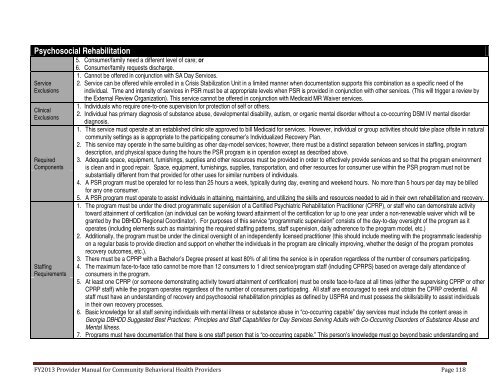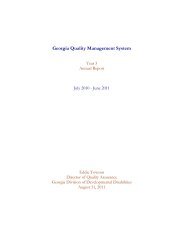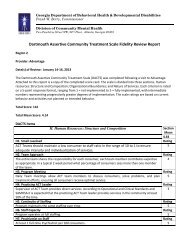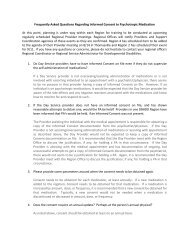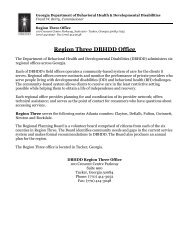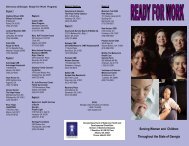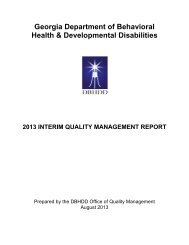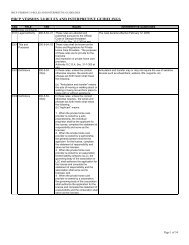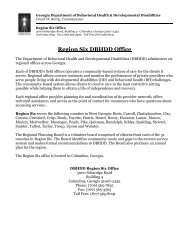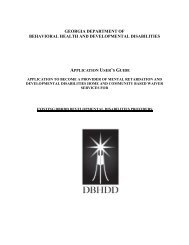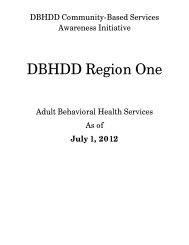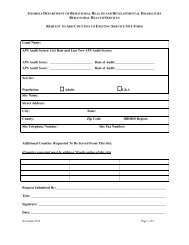Psychosocial Rehabilitation5. Consumer/family need a different level <strong>of</strong> care; orServiceExclusionsClinicalExclusionsRequiredComponentsStaffingRequirements6. Consumer/family requests discharge.1. Cannot be <strong>of</strong>fered in conjunction with SA Day Services.2. Service can be <strong>of</strong>fered while enrolled in a Crisis Stabilization Unit in a limited manner when documentation supports this combination as a specific need <strong>of</strong> theindividual. Time <strong>and</strong> intensity <strong>of</strong> services in PSR must be at appropriate levels when PSR is provided in conjunction with other services. (This will trigger a review bythe External Review Organization). This service cannot be <strong>of</strong>fered in conjunction with Medicaid MR Waiver services.1. Individuals who require one-to-one supervision for protection <strong>of</strong> self or others.2. Individual has primary diagnosis <strong>of</strong> substance abuse, developmental disability, autism, or organic mental disorder without a co-occurring DSM IV mental disorderdiagnosis.1. This service must operate at an established clinic site approved to bill Medicaid for services. However, individual or group activities should take place <strong>of</strong>fsite in naturalcommunity settings as is appropriate to the participating consumer’s Individualized Recovery Plan.2. This service may operate in the same building as other day-model services; however, there must be a distinct separation between services in staffing, programdescription, <strong>and</strong> physical space during the hours the PSR program is in operation except as described above.3. Adequate space, equipment, furnishings, supplies <strong>and</strong> other resources must be provided in order to effectively provide services <strong>and</strong> so that the program environmentis clean <strong>and</strong> in good repair. Space, equipment, furnishings, supplies, transportation, <strong>and</strong> other resources for consumer use within the PSR program must not besubstantially different from that provided for other uses for similar numbers <strong>of</strong> individuals.4. A PSR program must be operated for no less than 25 hours a week, typically during day, evening <strong>and</strong> weekend hours. No more than 5 hours per day may be billedfor any one consumer.5. A PSR program must operate to assist individuals in attaining, maintaining, <strong>and</strong> utilizing the skills <strong>and</strong> resources needed to aid in their own rehabilitation <strong>and</strong> recovery.1. The program must be under the direct programmatic supervision <strong>of</strong> a Certified Psychiatric Rehabilitation Practitioner (CPRP), or staff who can demonstrate activitytoward attainment <strong>of</strong> certification (an individual can be working toward attainment <strong>of</strong> the certification for up to one year under a non-renewable waiver which will begranted by the DBHDD Regional Coordinator). For purposes <strong>of</strong> this service “programmatic supervision” consists <strong>of</strong> the day-to-day oversight <strong>of</strong> the program as itoperates (including elements such as maintaining the required staffing patterns, staff supervision, daily adherence to the program model, etc.)2. Additionally, the program must be under the clinical oversight <strong>of</strong> an independently licensed practitioner (this should include meeting with the programmatic leadershipon a regular basis to provide direction <strong>and</strong> support on whether the individuals in the program are clinically improving, whether the design <strong>of</strong> the program promotesrecovery outcomes, etc.).3. There must be a CPRP with a Bachelor’s Degree present at least 80% <strong>of</strong> all time the service is in operation regardless <strong>of</strong> the number <strong>of</strong> consumers participating.4. The maximum face-to-face ratio cannot be more than 12 consumers to 1 direct service/program staff (including CPRPS) based on average daily attendance <strong>of</strong>consumers in the program.5. At least one CPRP (or someone demonstrating activity toward attainment <strong>of</strong> certification) must be onsite face-to-face at all times (either the supervising CPRP or otherCPRP staff) while the program operates regardless <strong>of</strong> the number <strong>of</strong> consumers participating. All staff are encouraged to seek <strong>and</strong> obtain the CPRP credential. Allstaff must have an underst<strong>and</strong>ing <strong>of</strong> recovery <strong>and</strong> psychosocial rehabilitation principles as defined by USPRA <strong>and</strong> must possess the skills/ability to assist individualsin their own recovery processes.6. Basic knowledge for all staff serving individuals with mental illness or substance abuse in “co-occurring capable” day services must include the content areas inGeorgia DBHDD Suggested Best Practices: Principles <strong>and</strong> Staff Capabilities for Day Services Serving Adults with Co-Occurring Disorders <strong>of</strong> Substance Abuse <strong>and</strong>Mental Illness.7. Programs must have documentation that there is one staff person that is “co-occurring capable.” This person’s knowledge must go beyond basic underst<strong>and</strong>ing <strong>and</strong>FY2013 Provider Manual for Community <strong>Behavioral</strong> <strong>Health</strong> Providers Page 118
Psychosocial Rehabilitationmust demonstrate actual staff capabilities in using that knowledge for individuals with co-occurring disorders. Personnel documentation should demonstrate that thisstaff person has received a minimum <strong>of</strong> 4 hours <strong>of</strong> training in co-occurring treatment within the past 2 years.8. If the program does not employ someone who meets the criteria for a MAC, CACII, <strong>and</strong>/or CADC, then the program must have documentation <strong>of</strong> access to anClinicalOperationsaddictionologist <strong>and</strong>/or one <strong>of</strong> the above for consultation on addiction-related disorders as co-occurring with the identified mental illness.1. Individuals receiving this service must have a qualifying diagnosis present in the medical record prior to the initiation <strong>of</strong> services. The diagnosis must be given bypersons identified in O.C.G.A Practice Acts as qualified to provide a diagnosis. These practitioners include a licensed psychologist, a physician or a PA or APRN(NP <strong>and</strong> CNS-PMH) working in conjunction with a physician with an approved job description or protocol.2. Rehabilitation services facilitate the development <strong>of</strong> an individual’s skills in the living, learning, social, <strong>and</strong> working environments, including the ability to makedecisions regarding: self-care, management <strong>of</strong> illness, life work, <strong>and</strong> community participation. The services promote the use <strong>of</strong> resources to integrate the individualinto the community.3. Rehabilitation services are consumer driven <strong>and</strong> are founded on the principles <strong>and</strong> values <strong>of</strong> individual choice <strong>and</strong> active involvement <strong>of</strong> individuals in theirrehabilitation. Through the provision <strong>of</strong> both formal <strong>and</strong> informal structures consumers are able to influence <strong>and</strong> shape service development.4. Rehabilitation services must include education on self-management <strong>of</strong> symptoms, medications <strong>and</strong> side effects; identification <strong>of</strong> rehabilitation preferences; settingrehabilitation goals; <strong>and</strong> skills teaching <strong>and</strong> development.5. All individuals should participate in setting individualized goals for themselves <strong>and</strong> in assessing their own skills <strong>and</strong> resources related to goal attainment. Goals areset by exploring strengths <strong>and</strong> needs in the individual’s living, learning, social, <strong>and</strong> working environments. Implementation <strong>of</strong> services may take place individually orin groups.6. Each individual must be provided assistance in the development <strong>and</strong> acquisition <strong>of</strong> needed skills <strong>and</strong> resources necessary to achieve stated goals.7. PSR programs must <strong>of</strong>fer a range <strong>of</strong> skill-building <strong>and</strong> recovery activities from which individuals choose those that will most effectively support achievement <strong>of</strong> theindividual’s rehabilitation <strong>and</strong> recovery goals. These activities must be developed based on participating individual’s input <strong>and</strong> stated interests. Some <strong>of</strong> theseactivities should be taught or led by consumers themselves as part <strong>of</strong> their recovery process.8. A PSR program must be capable <strong>of</strong> serving individuals with co-occurring disorders <strong>of</strong> mental illness <strong>and</strong> substance abuse utilizing integrated methods <strong>and</strong>approaches that address both disorders at the same time (e.g. groups <strong>and</strong> occasional individual interventions utilizing approaches to co-occurring disorders such asmotivational interviewing/building motivation to reduce or stop substance use, stage based interventions, refusal skill development, cognitive behavioral techniques,psychoeducational approaches, relapse prevention planning <strong>and</strong> techniques etc). For those individuals whose substance abuse <strong>and</strong> dependence makes it difficult tobenefit from the PSR program, even with additional or modified methods <strong>and</strong> approaches, the PSR program must <strong>of</strong>fer co-occurring enhanced services or makeappropriate referrals to specialty programs specifically designed for such individuals.9. The program must have a PSR Organizational Plan addressing the following:a. Philosophical principles <strong>of</strong> the program must be actively incorporated into all services <strong>and</strong> activities including (adapted from Hughes/Weinstein):i. View each individual as the director <strong>of</strong> his/her rehabilitation processii. Solicit <strong>and</strong> incorporate the preferences <strong>of</strong> the individuals servediii. Believe in the value <strong>of</strong> self-help <strong>and</strong> facilitate an empowerment processiv. Share information about mental illness <strong>and</strong> teach the skills to manage itv. Facilitate the development <strong>of</strong> recreational pursuitsvi. Value the ability <strong>of</strong> each individual with a mental illness to seek <strong>and</strong> sustain employment <strong>and</strong> other meaningful activities in a natural communityenvironmentvii. Help each individual to choose, get, <strong>and</strong> keep a job (or other meaningful daily activity)FY2013 Provider Manual for Community <strong>Behavioral</strong> <strong>Health</strong> Providers Page 119
- Page 1 and 2:
Georgia Department of Behavioral He
- Page 3 and 4:
UPDATED FOR JULY 1, 2013SUMMARY OF
- Page 5 and 6:
C&A Core ServicesBehavioral Health
- Page 7 and 8:
Community Supportsupports;9) Assist
- Page 9 and 10:
Community SupportServiceAccessibili
- Page 11 and 12:
Community Transition Planningv. App
- Page 13 and 14:
Diagnostic AssessmentTransactionCod
- Page 15 and 16:
Family Outpatient Services: Family
- Page 17 and 18:
Family Outpatient Services: Family
- Page 19 and 20:
Family Outpatient Services: Family
- Page 21 and 22:
Group Outpatient Services: Group Co
- Page 23 and 24:
Group Outpatient Services: Group Tr
- Page 25 and 26:
Individual CounselingServiceDefinit
- Page 27 and 28:
Medication AdministrationAdmissionC
- Page 29 and 30:
Nursing Assessment and Health Servi
- Page 31 and 32:
Continuing StayCriteriaDischargeCri
- Page 33 and 34:
Psychiatric TreatmentAdditionalMedi
- Page 35 and 36:
Service Plan DevelopmentPractitione
- Page 37 and 38:
CHILD & ADOLESCENT SPECIALTY SERVIC
- Page 39 and 40:
Behavioral AssistanceAssistance.Ser
- Page 41 and 42:
Crisis Stabilization Unit (CSU) Ser
- Page 43 and 44:
Crisis Stabilization Unit (CSU) Ser
- Page 45 and 46:
Intensive Family Intervention5. Bec
- Page 47 and 48:
Intensive Family Interventionconfid
- Page 49 and 50:
Intensive Family Intervention10. Th
- Page 51 and 52:
Structured Activity SupportsService
- Page 53 and 54:
Structured Residential SupportsClin
- Page 55 and 56:
Substance Abuse Intensive Outpatien
- Page 57 and 58:
Substance Abuse Intensive Outpatien
- Page 59 and 60:
Substance Abuse Intensive Outpatien
- Page 61 and 62:
RequiredComponents1. Any diagnosis
- Page 63 and 64:
Community Support3. Contact must be
- Page 65 and 66:
Community Transition Planning3. Jai
- Page 67 and 68: ContinuingStay CriteriaDischargeCri
- Page 69 and 70: Family Outpatient Services: Family
- Page 71 and 72: Family Outpatient Services: Family
- Page 73 and 74: Family Outpatient Services: Family
- Page 75 and 76: Group Outpatient Services: Group Co
- Page 77 and 78: Group Outpatient Services: Group Tr
- Page 79 and 80: Individual CounselingServiceDefinit
- Page 81 and 82: StaffingRequirementsServiceAccessib
- Page 83 and 84: Medication Administrationliving.Req
- Page 85 and 86: Nursing Assessment and Health Servi
- Page 87 and 88: Psychiatric Treatmentbehaviormodify
- Page 89 and 90: Psychological Testing: Psychologica
- Page 91 and 92: Service Plan DevelopmentRecovery pl
- Page 93 and 94: Ambulatory Substance Abuse Detoxifi
- Page 95 and 96: Assertive Community Treatmente. Ass
- Page 97 and 98: Assertive Community Treatment• Di
- Page 99 and 100: Assertive Community Treatment• di
- Page 101 and 102: Assertive Community Treatment11. Fo
- Page 103 and 104: Assertive Community Treatmentin whi
- Page 105 and 106: Consumer/Family AssistanceTransacti
- Page 107 and 108: Consumer/Family Assistancecriticaln
- Page 109 and 110: Crisis Stabilization Unit Servicesb
- Page 111 and 112: ClinicalExclusionsDocumentationRequ
- Page 113 and 114: Peer Support Services4. Individual
- Page 115 and 116: Peer Support ServicesClinicalOperat
- Page 117: Psychosocial RehabilitationUnit Val
- Page 121 and 122: Psychosocial RehabilitationBilling
- Page 123 and 124: Residential: Independent Residentia
- Page 125 and 126: Residential: Intensive Residential
- Page 127 and 128: Residential: Semi-Independent Resid
- Page 129 and 130: Residential Substance Detoxificatio
- Page 131 and 132: ServiceDefinitionAdmissionCriteriaC
- Page 133 and 134: AdmissionCriteria,continuedContinui
- Page 135 and 136: 1. It is expected that the transiti
- Page 137 and 138: DocumentationRequirements1. Every a
- Page 139 and 140: FY2013 Provider Manual for Communit
- Page 141 and 142: TABLE B: Physicians, Physician’s
- Page 143 and 144: COMMUNITY SERVICE STANDARDS FOR ALL
- Page 145 and 146: 3. The provider details the desired
- Page 147 and 148: 7. The provider’s practice of cul
- Page 149 and 150: c. Is not permitted in developmenta
- Page 151 and 152: 2. Policies, procedures, and guidel
- Page 153 and 154: 3. Safe transport of persons served
- Page 155 and 156: iv. There are safeguards utilized f
- Page 157 and 158: i. The date and time the medication
- Page 159 and 160: Training Requirements for all Staff
- Page 161 and 162: Qualified MedicationAide (QMA)Psych
- Page 163 and 164: Addiction CounselorTrainees (ACT)Hi
- Page 165 and 166: CADC, CCADC, CAC II or MAC and is r
- Page 167 and 168: practitioner), s/he could bill as a
- Page 169 and 170:
COMMUNITY SERVICE STANDARDS FOR ALL
- Page 171 and 172:
4. ORDER/RECOMMENDATION FOR COURSE
- Page 173 and 174:
ii. Services, supports, and treatme
- Page 175 and 176:
xv.xvi.xvii.Recorded changes - Any


